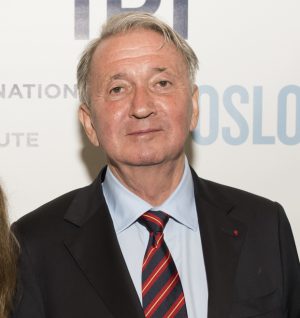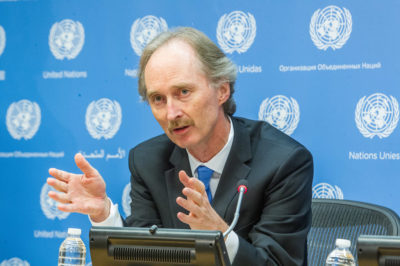UPDATED: Norway’s state auditor general is strongly criticizing Norway’s foreign ministry (Utenriksdepartementet, UD) over its own largely uncritical funding of the International Peace Institute (IPI) in New York. IPI was until recently run by Terje Rød-Larsen, UD’s own former diplomat, who had to resign in disgrace because of his and IPI’s connections to the late financier and convicted sex offender Jeffrey Epstein.

The auditor general (Riksrevisjonen) has concluded, after a lengthy investigation, that the foreign ministry did not take questions around potential conflicts of interest with IPI’s leadership seriously enough. Rød-Larsen, who gained international recognition along with his wife and colleague Mona Juul for their roles in drafting the Oslo Agreement between Israel and the Palestinians, later founded IPI and received millions of kroner in funding for the think tank from Norway’s foreign ministry for several years. Juul continues to work for UD and currently serves as Norway’s ambassador to the UN.
The auditor general’s probe into UD’s funding of the IPI began after newspaper Dagens Næringsliv (DN) disclosed ties between Rød-Larsen and the wealthy Epstein, who became suspected of trying to buy a better reputation after his first conviction for sexual assault. Epstein donated to a wide variety of causes and organizations including the IPI, and is believed to have gained some influence over Rød-Larsen, who resigned under a cloud last fall.
“The Foreign Ministry did not control how IPI spent its money, broke the rules over how it handled funding to IPI and didn’t take questions over conflicts of interest seriously,” claimed the state auditor in its report released late Thursday morning. IPI has also had close ties to the UN itself.
‘Considerable weaknesses’
DN reported on Thursday that the auditors probed how UD followed rules applying to its funding of IPI between 2006 and 2012, during which IPI received more than NOK 50 million. The auditors found “considerable weaknesses” in the ministry’s procedures, control and follow-up of the funding. The ministry, according to the auditors, did not make sure that “necessary evaluations regarding conflicts of interest” were carried out.
Not only did Rød-Larsen have his own close ties to UD, where his wife still works as a top diplomat, he was also a close friend of another top Norwegian diplomat, Geir O Pedersen, who also has long held posts in the ministry’s leadership, as an ambassador (to the UN and, later, China) and as a UN Special Envoy.

Pedersen, a former director general at the ministry, was also leader of the department within UD that approved funding to IPI for several years. DN has reported that Pedersen’s wife also worked for IPI.
The auditor general noted that conflict-of-interest questions weren’t taken seriously “even though the political leadership in the ministry has informed Parliament that funding decisions made were of a character that suggested special attention for all involved.”
An evaluation made by the ministry itself in 2012 suggested Pedersen had a conflict of interest in approving funding for IPI because “in addition to their personal friendship, they (Pedersen and Rød-Larsen) have a history of professional cooperation in among other areas, the Middle East.”
Auditors found no documentation, howevever, that Pedersen evaluated his own impartiality. He took part in continuing to fund IPI during the entire period examined by the auditors.
“It’s both surprising and worthy of criticism that UD didn’t make the necessary evaluations of impartiality when they handled funding to IPI from 2007 to 2012,” stated State Auditor General Per-Kristian Foss. “They knew that this was important and should have had established systems and routines for that.”
Foss told DN that he didn’t want to comment on individuals involved “because we’re looking at systems.” He added, however, that the funding process for IPI indicates that it reflected how Rød-Larsen’s contacts within the ministry were too close. “There was very friendly handling of IPI, and that’s not how a ministry should act,” Foss told DN. “Contact can be too close when systems aren’t controlled and questions weren’t asked about how the ministry’s funds were used at IPI.”
‘Working on improvements’
Foreign Minister Ine Eriksen Søreide, who, like Foss, comes from the Conservative Party, was said to now be taking the auditor’s criticism seriously. She noted that even though the auditor’s examination was for the years 2007-2012, before the Conservative Party won government power away from the Labour Party in 2013, its findings “are still important for the the ministry.”
Søreide, who now serves as Juul’s boss, claimed that “several measures” had been taken since 2013 to improve the systems and quality of managing funding support from the foreign ministry. She also believes ministry staff is now “more conscious” about the need to avoid conflicts of interest.
“The Foreign Ministry will use the state auditor’s findings and recommendations to continue working on better funding systems and following the rules, also to strengthen documentation of evaluations made,” Søreide stated.
Pointing finger at Labour Party and Jonas Gahr Støre
Her state secretary Audun Halvorsen called the auditor’s report “a critique of how funding outlays from the foreign ministry functioned during the previous Labour Party-led government when Jonas Gahr Støre was foreign minister.” Halvorsen also stressed that all funding to IPI ended in 2018.
Støre, now Labour’s candidate for prime minister, was also part of Norway’s peace-brokering efforts in the 1990s and worked with Rød-Larsen (who had ties to Labour), Juul and another top diplomat, Jan Egeland, now head of the Norwegian Refugee Council. Støre has earlier told DN that he thinks UD had “good routines for evaluating requests for support, and that Geir O Pedersen ran his department and areas of responsibility in line with routines and quality assurance at the time.”

Pedersen, who today serves as the UN’s Special Envoy to Syria, wrote in an email to DN on Thursday that he had reviewed the state auditor’s criticism. He still believes, however, that he was impartial in his relations with Rød-Larsen when he was director general of the ministry.
Pedersen claimed their relationship was “primarily job-related” and contact between them declined in later years. In his opinion, his handling of IPI’s funding allocations “were in line with Norwegian legal practice and the ministry’s legal evaluation.” Pedersen also noted that UD’s financial support for IPI declined during his period as director general.
Rød-Larsen himself has consistently declined comment on the IPI funding case and his ties to Epstein, has attempted to discredit DN as merely a “tabloid” despite its many press awards over the years, and remained unavailable for comment on the auditor general’s report. His wife Mona Juul now represents Norway on the UN Security Council and the couple lives in New York.
newsinenglish.no/Nina Berglund

